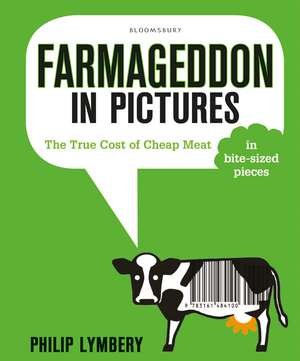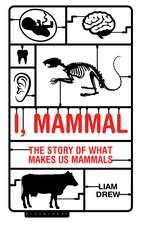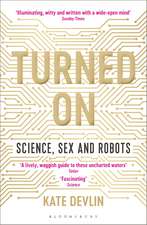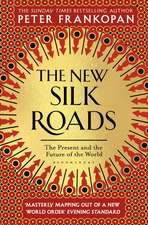Farmageddon in Pictures: The True Cost of Cheap Meat – in bite-sized pieces
Autor Philip Lymberyen Limba Engleză Paperback – 8 mar 2017
Preț: 68.72 lei
Preț vechi: 85.92 lei
-20% Nou
Puncte Express: 103
Preț estimativ în valută:
13.15€ • 14.29$ • 11.06£
13.15€ • 14.29$ • 11.06£
Carte disponibilă
Livrare economică 31 martie-14 aprilie
Preluare comenzi: 021 569.72.76
Specificații
ISBN-13: 9781408873465
ISBN-10: 140887346X
Pagini: 192
Dimensiuni: 189 x 230 x 16 mm
Greutate: 0.58 kg
Editura: Bloomsbury Publishing
Colecția Bloomsbury Publishing
Locul publicării:London, United Kingdom
ISBN-10: 140887346X
Pagini: 192
Dimensiuni: 189 x 230 x 16 mm
Greutate: 0.58 kg
Editura: Bloomsbury Publishing
Colecția Bloomsbury Publishing
Locul publicării:London, United Kingdom
Caracteristici
For fans of Michael Pollan's The Omnivore's Dilemma, Felicity Lawrence's Not On the Label, Joanna Blythman's Shopped and Channel 4's Food Unwrapped, Farmageddon has the potential to define a generation akin to Al Gore's An Inconvenient Truth and Rachel Carson's Silent Spring
Notă biografică
Philip Lymbery is the CEO of leading international farm animal welfare organisation, Compassion in World Farming and a prominent commentator on the effects of industrial farming.
Cuprins
Introduction1. Nature2. Health3. Why Animals Matter4. Resources5. The SolutionsReferencesIndexAcknowledgements
Recenzii
Lymbery brings to this essential subject the perspective of a seasoned campaigner - he is informed enough to be appalled, and moderate enough to persuade us to take responsibility for the system that feeds us
This eye-opening book, urging a massive rethink of how we raise livestock and how we feed the world, deserves global recognition
A devastating indictment of cheap meat and factory farming. Don't turn away: it demands reading and deserves the widest possible audience
This incredibly important book should be read by anyone who cares about people, the planet, and particularly, animals
Offers the kind of realistic and compassionate solutions on which our prospects for a truly sustainable world depend
This meaty account makes a distinctive and important contribution, eschewing the narrowly domestic focus of many of its predecessors in favour of a global investigation ... An engaging read - and it also gives a full enough picture of the situation in the UK to preclude any smugness on the part of the British reader. Anyone after a realistic account of our global food chain, and the changes necessary for a sustainable future, will find much to get their teeth into here
There's no end to techno-idiocy in pursuit of profit. But far more concerning is Lymbery's contention that the wastefulness of feeding human-edible plants and fish to animals is not just absurd but catastrophic. The main reason for hacking down the remaining South American forest is to grow soy to feed the pigs and chickens of China
This eye-opening book, urging a massive rethink of how we raise livestock and how we feed the world, deserves global recognition
A devastating indictment of cheap meat and factory farming. Don't turn away: it demands reading and deserves the widest possible audience
This incredibly important book should be read by anyone who cares about people, the planet, and particularly, animals
Offers the kind of realistic and compassionate solutions on which our prospects for a truly sustainable world depend
This meaty account makes a distinctive and important contribution, eschewing the narrowly domestic focus of many of its predecessors in favour of a global investigation ... An engaging read - and it also gives a full enough picture of the situation in the UK to preclude any smugness on the part of the British reader. Anyone after a realistic account of our global food chain, and the changes necessary for a sustainable future, will find much to get their teeth into here
There's no end to techno-idiocy in pursuit of profit. But far more concerning is Lymbery's contention that the wastefulness of feeding human-edible plants and fish to animals is not just absurd but catastrophic. The main reason for hacking down the remaining South American forest is to grow soy to feed the pigs and chickens of China














